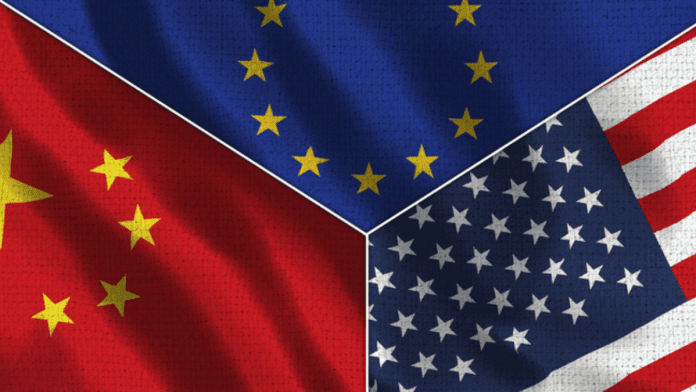A quiet shift is unfolding across Europe. Countries that once hesitated to get too close to China are now opening their doors to Chinese factories, investments, and electric vehicles. Behind this change is a powerful force—U.S. trade tariffs introduced under President Donald Trump. These tariffs are making Europe a more attractive market for Chinese companies that are now locked out of the U.S.
While the amount of Chinese money flowing into Europe has dropped from its peak years, its purpose has become more focused. Factories, battery plants, and electric vehicle production are at the center of this new wave of investment. And the political reactions across the continent are just as divided as the economic ones.
Europe’s Investment Landscape Is Shifting
In the coastal town of Sines, Portugal, a major change is underway. Chinese battery maker CALB has started work on a $2.2 billion factory. It promises 1,800 new jobs and marks a shift from China buying European assets to building its own from scratch.
💥 Deal of the decade? Trump slaps 19% tariff on Philippines—U.S. exports get free pass
Across the continent, a similar pattern is emerging. In Hungary, companies like BYD Co. and CATL are constructing massive battery and EV plants to support carmakers like BMW, Mercedes, and Audi. Slovakia is also in the spotlight, with Geely’s Volvo Cars building a €1.2 billion plant in Kosice.
Further south in Serbia, China’s Zijin Mining and HBIS Group now control some of the nation’s largest exporters, including steel and copper plants. The shift from Western buyers to Chinese builders is creating new jobs but also raising security and political concerns.
In Sweden, Chinese battery firm PTL (Putailai) canceled a €1.4 billion project after strict conditions were imposed under a new investment law. Poland has also expressed concerns about Chinese control over a port near a NATO base and undersea cable damage possibly linked to Chinese vessels.
Chinese Factories Replace Football Clubs and Ports
In the past, China bought everything from power companies to football teams in Europe. Deals like China Three Gorges’ investment in Portugal’s EDP, and Fosun’s purchase of Club Med, were common. But some of those deals backfired.
Meta System SpA, an Italian electronics firm, nearly collapsed after its Chinese owner, Deren Electronics, failed to help it restructure. And Suning Holding Group, which once owned Inter Milan, defaulted on a loan, allowing Oaktree Capital to take control of the club.
EU retreats—for now: €21B tariff blitz paused as Trump threatens Europe with economic war
Now, China is shifting its strategy. Greenfield investments—like new battery and car factories—are replacing old-style takeovers. Between 2019 and May 2024, nearly all of China’s investments in Europe have gone into automotive and battery sectors.
According to experts like Gregor Sebastian from Rhodium Group, Chinese leaders are encouraging this move to reduce “non-productive” deals, like those in sports and luxury brands, and instead support technology, energy, and transport.
The friendliest countries to this shift include Hungary, Slovakia, and Serbia, which are now welcoming Chinese jobs, money, and infrastructure. Hungarian Prime Minister Viktor Orban has openly supported this wave and stood beside BYD’s Chairman Wang Chuan-Fu in May as they launched a major plant near Szeged.
Trump’s Trade Tariffs Are Driving Chinese Investment Toward Europe
One of the biggest reasons for this change is U.S. policy under President Donald Trump. His administration’s new tariffs on Chinese goods and even some European products are making it harder for China to do business in the U.S. In response, many Chinese companies are now investing more in Europe to avoid those barriers.
EU sanctions slam India’s giant oil refinery—Rosneft’s Gujarat stronghold frozen
This shift has not gone unnoticed. U.S. Treasury Secretary Scott Bessent warned Europe that moving closer to China would be like “cutting your own throat.” But some European leaders are choosing a different path.
In April, Spanish Prime Minister Pedro Sanchez visited Xi Jinping in Beijing and offered full support for stronger EU-China ties. French President Emmanuel Macron also welcomed Chinese investment, though he insisted on fair competition.
On the other hand, Germany is walking a fine line. Under new Chancellor Friedrich Merz, Berlin must decide whether to allow Chinese turbines in a North Sea wind farm, a key test of its new China policy. Germany remains China’s largest trading partner in Europe, making this decision particularly sensitive.
While Europe’s top leaders like Ursula von der Leyen speak of “de-risking” from China, countries like Serbia, Hungary, and Slovakia are speeding ahead. Serbia’s President Aleksandar Vucic even said President Xi told him, “If you need something, dear friends, do ask us,” during a meeting in Moscow.
Despite differences, China is pushing hard to repair and grow its ties in Europe. In April, China lifted sanctions on EU lawmakers. And Commerce Minister Wang Wentao met with EU Commissioner Maros Sefcovic, urging for stronger cooperation and fewer barriers.


